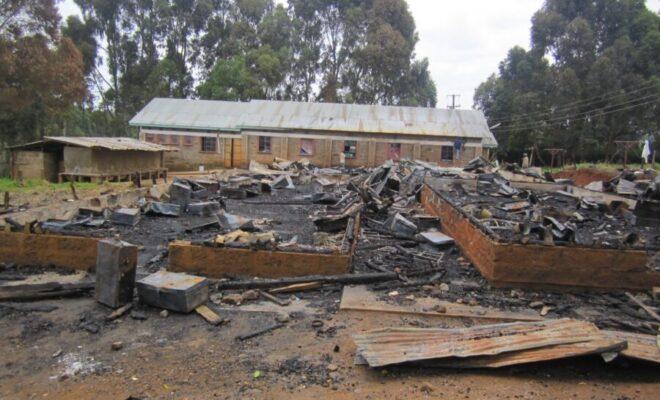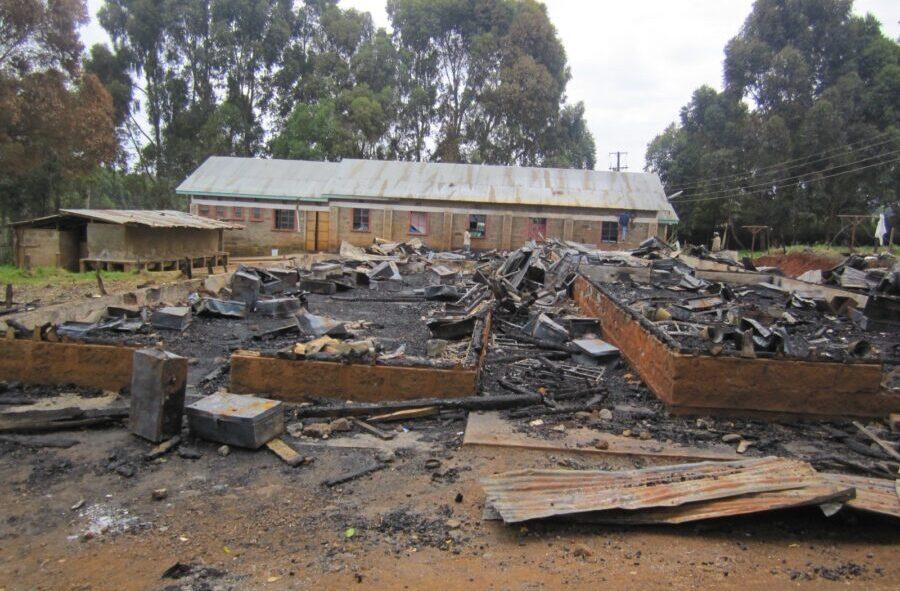Kenyan students keep setting their schools on fire. Where’s the alarm?

Students setting dozens if not hundreds of schools on fire each year is no longer surprising. What’s shocking is the government’s apathy.

A Kenyan secondary boarding school soon after it was burnt down. Credit: Elizabeth Cooper.
When the pandemic struck in 2020, students, parents and educators across Kenya worried about how school closures would affect children’s wellbeing and progress. Nearly as soon as lockdowns eased in early-2021, the overriding concern became whether those students would set fire to their schools. In their first month back, students in Kenya set alight at least 25 secondary boarding schools. This October and November, at least 40 more were hit with arson.
Tragically, one student has died in one of this year’s fires. Hundreds more have experienced the fright of waking to find their dormitories on fire, watched their personal possessions burn, and been threatened by authorities to confess responsibility. Dozens of secondary students have been arrested and are awaiting potential criminal prosecutions. Several schools have been closed pending new funding (mostly from parents) to reconstruct damaged buildings.
The fright of each incident of arson is real, but the overall trend of school fires in Kenya is no longer shocking. According to my tracking of government and media reports, there were at least 750 arson attempts at Kenyan secondary boarding schools from 2008-2018. In some years, there have been relatively more – there were 239 such cases in 2016, for instance – but every year has seen dozens of arson attempts.
Why are schools being set on fire?
Each year has also witnessed a torrent of analysis about the causes of these fires. In 2008, for example, a parliamentary committee tasked with investigating secondary students’ unrest held 33 public hearings involving thousands of Kenyans. In 2016, another parliamentary committee interviewed people at 97 schools.
The scope of factors raised in those public inquiries – as well as in most media coverage – has been expansive. The 2008 investigation led to a massive report identifying 49 “possible root causes” and 124 recommendations. The 2016 task force cited, among other things, students’ indiscipline, alcohol and drug abuse, peer pressure, school mismanagement, congestion in dormitories, too many exams, criminal gangs, tribalism, poor parenting, students’ use of social media, and sensational media reporting. On the one hand, such comprehensiveness might indicate an appreciation of the complex set of factors underlying the phenomenon. On the other hand, this breadth has arguably contributed to the lack of clear action that follows.
I have conducted research in Kenyan boarding schools since 2013, interviewing dozens of students, former students, teachers, and principals. These institutions predominantly focus on exam preparedness, which often translates into notoriously rigid and painful conditions for students. This is not unique to Kenya, but nearly everyone I spoke to acknowledged that Kenyan students turn to arson because they do not feel they have other means to express their grievances.
As one student explained: “There was a suggestion box, but, you know, this is Kenya; no one reads the suggestion box.” Another described: “At first you start with the suggestion box. And if they refuse to reply, you go to another tactic like a riot. And if that doesn’t work, then a fire. And then they’ll come to agree with us that they must do something.”
A hostile government
Secondary boarding students are aggrieved about many things. The reason they turn to arson is because they believe it’s their only option to be taken seriously. Yet in response to school fires, the government’s typical response is to double-down on discipline and punishment. For years, education secretaries have issued ultimatums, called students “primitive” or “hooligans”, and vowed to “crack down” on them through more severe punishments.
Often this devolves into big men like the current Education Cabinet Secretary pleading for permission to hit students. All year, George Magoha has been making headlines by declaring his desire to “bring back the cane”. He argues that “we need to give teachers power to punish” because there are children “who have grown horns.”
This kind of dehumanising rhetoric shuts down the possibility of considering students’ acts as meaningful. In characterising the country’s students as evil and irrational, politicians attempt to insulate themselves from any responsibility for students’ desperate and angry actions. As Wandia Njoya observes, “the brutality against children is often blamed on the children themselves, which allows Kenyan adults to avoid the reality that the real problem is the school system.” Moreover, such vilification of “unruly” students allows politicians to portray themselves as the country’s required disciplinarians.
What are the prospects for change?
To tackle the issue of school fires, the government needs to put in the hard work of compassionate listening, critical thinking, and systemic reforms. All three are required to tackle the punishing logic of boarding schools that Kenya’s intensely competitive education system produces. And all three are needed to prove to young Kenyans that violence is not the only way to earn influence in the public realm.
There are some signs of change to watch. First, there are growing calls for boarding schools to be phased out, although Magoha has said this possibility “is not an issue to bother at the moment”. Second, the government is busy implementing a new “competency-based curriculum” that it says will be more learner-centred. However, as education-focused analysts and parents argue, the changes seem more inclined to make education even less equitable as more opportunities for privatisation creep in.
After hundreds of school fires, there may be change on the horizon. But in grappling with how it might unfold, we should start by recognising that the status quo actually works just fine for those at the top: an education system organised around fierce competition, unequal opportunities, and a hierarchical and imperious mode of governance helps to contain citizens’ aspirations. And “unruly students” provide a perennial scapegoat to bolster the legitimacy of a disciplinarian government.





I really like this please send me a copy when done with.